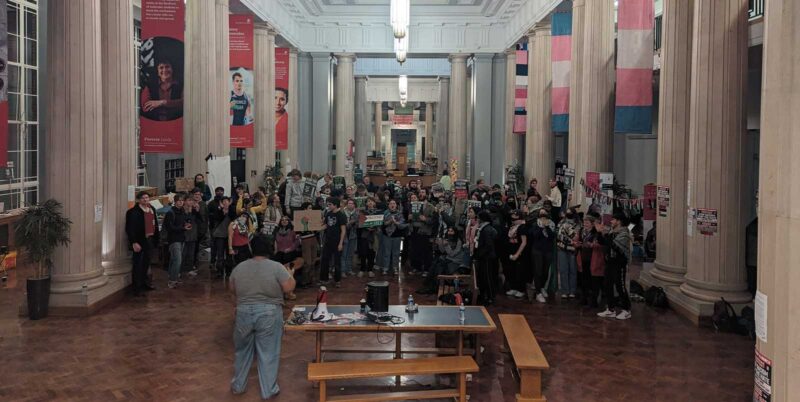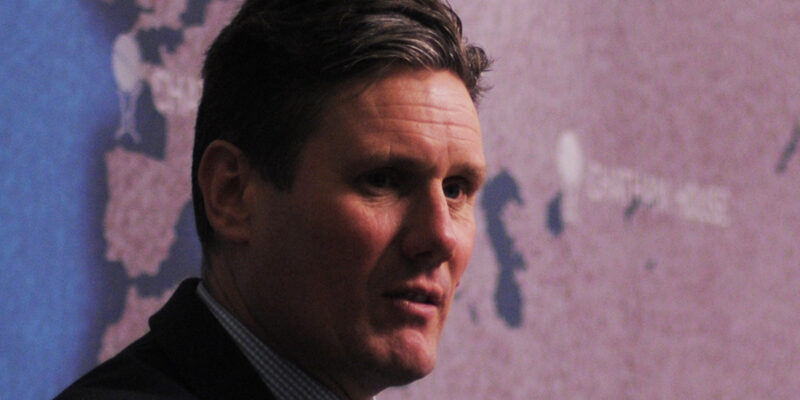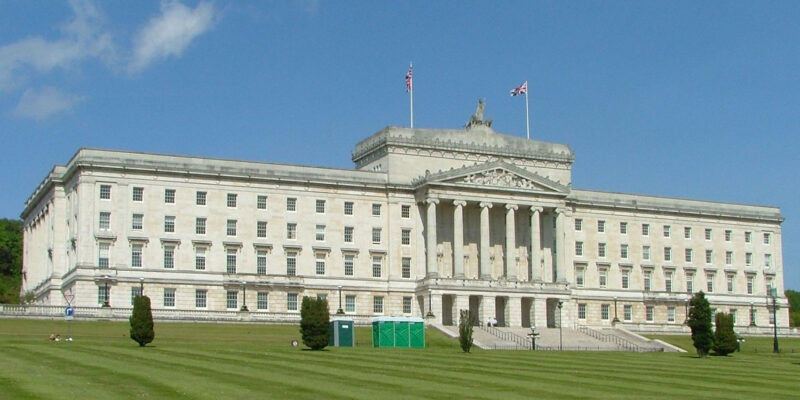France: united action can still defeat Macron’s labour reforms
PARIS – A MAJOR attack against workers’ rights has been expected since President Emmanuel Macron’s election on May 7. The “reform” of the Labour Code, which embodies trade union and workplace negotiating rights, was a major theme of its campaign. He billed it as “freeing” labour but most people realised it was “freeing” the employers to sack workers and employ others on insecure contracts and lower wages.

Macron rapidly made it clear that he would use the President’s powers to issue decrees with the force of law, thus avoiding any delays arising from debates in parliament: this, even though his new movement En Marche, has a solid majority.
But despite fair warning the workers’ movement did little to prepare itself for the coming battle. The limited scale of a series of mobilisations in early September reflects this. Is Macron close to a scoring a major victory that will only be first of many? Or is there still the possibility of stopping him in his tracks?
At the beginning of the year it seemed shocking when François Fillon, the candidate of the UMP, the centre-right Gaullist party, promised the bosses a “blitzkrieg” against workers’ rights if he was elected. Less then six months later, Emmanuel Macron is implementing exactly the same programme, but provoking much less turmoil than would have been the case had it been Fillon.
What is the content of his “reform”? As a result of pressure from the OECD, measures that have already been carried out in many other EU countries like Germany, Italy, Spain, the new laws deliver a major blow to the Code du Travail, which protected workers against bosses sacking their employees without serious justification. Now the boss will have to pay only a limited sum as compensation. In small companies, the boss will be able to sign agreements with workers’ “representatives” who are not trade union negotiators, or initiate a referendum on any new work contract over the union’s head. New short-term contracts with even less protection for workers will also be introduced as well as a weakening of the rights of the workforce’s own elected representatives.
The message is clear: the bosses will have a free hand to degrade conditions in order to make themselves “more competitive”: there will be a race to the bottom. While the government tries to justify this by claiming that it is removing “fetters” on the labour market, creating millions of new jobs, economists predict the first effect will be a wave of sackings.
To ensure victory, the government has pulled a series of tricks. First, Macron’s executive orders (ordonnances) were launched during during the summer holiday period. Second, he lured the trade union leaders into a series of “negotiations”. Even the traditionally more militant General Confederation of Labour (CGT) accepted this farce and joined the discussions with ministers.
As a result the French Confederation of Labour (CFDT) and Force Ouvrière, (FO) were suborned into not opposing the changes, breaking the united front between the federations established last year against a similar law proposed by the Socialist Party (PS) government, in which Macron himself was a key minster.
Finally, the full content of the new laws was kept secret until the beginning of September and the union representatives did not receive a written draft. But the killer argument FO and the CFDT fell for was that the President had received a mandate for his actions from the French people. Only the revolutionary left warned this would be the case when they argued against voting for Macron as the lesser evil to “stop Le Pen and the National Front (FN)”. Now the chickens have come home to roost.
Nevertheless Macron’s mandate to attack workers is largely a fraud since a huge percentage of his vote gave stopping Le Pen as their main or sole reason. And a record 12 million registered electors did not vote (25.38 per cent) and four million (9 per cent) cast a blank vote. In late September Macron’s “dissatisfaction rating” has risen to 53 per cent with 20 per cent very dissatisfied.
With two of the three big union federations sitting it out, it is not surprising that the first day of action on September 12, called by CGT, FSU (the teachers union) and Solidaires (SUD) was large but not overwhelming. The CGT claimed there were 400, 000 strikers in 100 demonstrations across the country.
In Paris, the fighting spirit and determination of the workers was clear and perceptible in the slogans against Macron and his government. However, the next steps were not so clear. The CGT called for another day of action on September 21, which was not so well supported, even though several CFDT and FO branches and local unions joined in this time.
Indeed there is a lot of confusion amongst the union the leadership. CGT did little over the summer to prepare for a massive and prolonged movement. On September 26, unionized truck drivers started an indefinite strike against the law, as it would operate in their sector, but with limited impact. Public sector workers, metal workers, health workers, teachers, retired workers all will have separate days of action in the following weeks. But coordination has been weak and sporadic.
To add to this situation, Jean-Luc Mélenchon called for a national demonstration on September 23 by his new populist movement La France Insoumise, (Insurgent France), separately and independently of the trade union front. That demo was a limited success, with about 30,000 marching in Paris and then listening to the usual long oration by their egotistical leader. This number in itself demonstrates that Mélenchon, while having some remaining support in the working class movement, despite having abandoned the red flag for the tricolor and indulging in unbridled nationalism, has no right to claim to be the political leader of the opposition, ignoring all the other parties and unions, in a dangerous and divisive strategy.
Clearly, there still is the possibility for a major movement against Macron. He has indeed added provocation after provocation, attacked pensions, cut state-aided jobs, called workers who oppose him lazy, and explained that democracy does not happen on the streets. Even students have reasons to demonstrate, as access to university might be restricted in the future and conditions there are already appalling both for students and teachers.
However, the conditions for a major movement would require either very strong pressure from below with spontaneous mass activity (as in 1936 or in 1968), or a well defined sector capable of paralysing the country (like the train workers in 1995) or most effectively a united leadership with a clear strategy that can rouse mass revolt on the streets and in the workplaces. However, the bitter truth, which must be recognised, is that all three are missing at the moment. While there are many signs that the working class is opposed to Macron’s plan, it is objectively difficult to transform this into a mass movement, let alone the generalised strike action necessary to defeat it.
Today it is not clear how the situation will develop. There is certainly a terrible danger that the movement fizzles out, worn out by repeated of days of actions, getting smaller and with no well-defined perspective. This would be automatically a major victory for Macron who would then prepare other attacks and defeat sector after sector of the working class in isolated battles, in the way Thatcher did in Britain in the 1980s.
However, there still remains the possibility that the movement can dig in, overcome its divisions and draw new strength form each section coming under attack. But this will require coordination, with a political force fighting for action in the workplaces, in the secondary schools and universities, in the banlieues and on the streets. Of course a major mobilisation of the youth is the factor that could revitalise the movement. Young people were the key element in the last victory of the French workers, the defeat of the CPE laws in 2006.
A determined intervention by even a small body of activists could tip the situation in this direction. Trade union forces, like Solidaires, plus militant sectors of the CGT, and political forces like the New Anticapitalist Party (NPA) have supported the new Front Social (an initiative of militant rank and file union activists).
They were right to mount an intervention into the France Insoumise demonstration in Paris on September 23. Whilst not joining the march behind the tricolors they held their own rallying “points fixes”, stalls with slogans and leaflets; calling for a united front against Macron.
They stated,
“This is a coup d’ état. So let’s put our money where our mouth is! A united front against Macron is what we need – now, not tomorrow, or the day after tomorrow, or later, when the time comes to vote. By then Macron, like Hurricane Irma, will have destroyed all our social gains. Should we wait for a social catastrophe to react in a coordinated way? (…) This social coup d’ état calls for the growth of our energies, militant forces and the spirit of unity. But at the moment we face the diminishing and dispersal of our forces:
They concluded,
“…we must prepare a new action that is even broader, involving all sectors, but prolonged, aimed at seriously bringing the economy to a halt.”
This is the right approach but now it needs to find a response amongst young people, school and university students and above all amongst workers. The NPA needs to throw all its forces into achieving this. But unfortunately it is divided between a wing looking to Mélenchon’s Left-wing populism as the opportunity for a recomposition of the workers’ movement, and another tendency that is more oriented towards the Front Social. We need to be absolutely clear that Mélenchon’s aim is not the recomposition of the workers’ movement but its liquidation into a cross-class Gaullism “of the left” with himself playing the role of Le Général.
Together with initiatives at the level of the already organised forces, we need initiatives from below in the workplaces, lycées, and universities and in the working class and immigrant districts. General assemblies should be called to prepare the next strikes, to support every sector coming into struggle and to adopt a clear set of immediate demands: the repeal of the Macron edicts on the Labour Code and other attacks, the repeal of the state of emergency and the planned laws that would make it permanent, together with demands for massive job creation for younger people, an end to précarité (transforming short-term jobs into stable ones with the same rights as the other workers), etc.
Above all, workers coming into struggle should demand a united front of all labour and socialist organisations, coordinated by workplace and general assemblies, to prevent the sectarians and ego-trippers sabotaging the struggle and leading France’s workers to a historic defeat.






